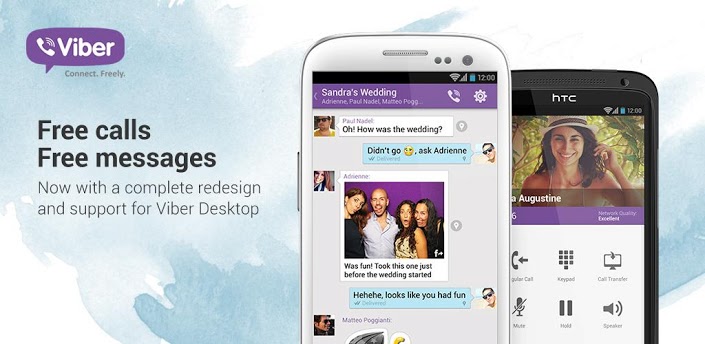Affiliate links on Android Authority may earn us a commission. Learn more.
Viber wants to hijack incoming IDD calls as "terminator" to reduce call costs

Viber is a cross-platform messaging and VoIP app, and its latest iteration extends calls, IM and even video conferencing to desktop users. At approximately 200 million, its user base is particularly impressive, even compared to the likes of Facebook Messenger, WhatsApp, WeChat and LINE. But how does Viber earn profits from this popularity? Is it going to match or outlast the likes of Skype?
Apart from adopting a freemium model and selling IM stickers and emoticons on its sticker store, there is no clear word yet as to how the Cyprus-based Viber Media aims to generate revenues out of its cross-platform app and its rapidly growing user-base.
Routing non-Viber calls through Viber
Recently, information published on Israeli tech blog Geektime is hinting a new possible model through which Viber plans to generate revenues. It appears that Viber is set to implement a feature that would allow its app to intercept regular phone calls, essentially hijacking the call from the cellular network. This only works, though, with carriers that have an agreement with Viber to taking over call termination for international calls.
Call termination is the process of forwarding a call to a PBX server referred to as a terminator, which is basic step in the processing of international calls. Each call made passes through a wireless carrier that forwards a call to a PBX central redirector that, in turn, determines which terminator to use. The terminator then routes the call to a wireless carrier that connects the call to the intended receiving phone. In this case, with Viber as the terminator, it can decide to call the recipient using its own network.

How Viber aims to make money with this setup
Terminators are chosen based on inter-corporate contracts. Companies that wish to take charge of call termination would have to negotiate with local carriers to be designated as terminators, to obtain the right to transfer outgoing calls from one country to another. Of course, being designated as a terminator means receiving revenues that could be as high as 1.5 euro cents (about US$0.02) per minute.
Viber Media reportedly aims to become a terminator for various carriers in countries where the Viber app is popularly used. Geektime reported that Viber Media has already initiated a pilot project with a Dutch mobile telecommunications company.
In the pilot project, an outgoing call made through the Dutch mobile operator passes through Viber (as terminator) and is forwarded to the Viber app if the intended receiver of that call is a Viber user. If the intended call receiver is not a Viber user, the call will be transferred accordingly.
As mentioned, being a terminator allows Viber to get paid a share of the IDD revenues for non-Viber calls made to Viber users. This is certainly a viable setup considering that Viber already has 200 million users worldwide. Plus, Viber already has a record of its users’ phone numbers, which makes it easy to compare against incoming calls intended for termination. At this point, Viber only needs to convince mobile operators to work with them. Presumably, Viber’s trump card is going to be an offer of lower call termination rates, thereby also lowering the per-minute charges for users.
Benefits for Viber Users
If Viber’s call service quality remains the same, users have nothing to worry about. In Android Authority‘s interview with Viber CEO Talmon Marco, he tells us that Viber offers high-quality voice calls even over very slow connections (as low as 8 Kbps). The company therefore promises crystal-clear communications across a wide array of network speeds.

This can also result in lower call rates in general. If Viber decides to play price competition against other companies that also want to become terminators, this will result in a decline of termination rates. This proposed business model is only going to affect international calls, though. Local calls and Viber to Viber calls are still not going to yield revenues for Viber.
In a response sent to Geektime regarding the article it published on the speculated business model, Viber confirmed that the company is indeed exploring new ways to integrate standard telephony with Viber’s service. The test done with a Dutch mobile operator happens to be one of these new and innovative ways.
Here is a copy of Viber’s official statement:
[quote qtext=”Viber is running multiple tests at any given point in time aimed at exploring innovative ways to integrate with the standard telephony system and offer new and exciting service. The service mentioned in the article is one such test that was run with an extremely small number of users, reflecting less than 0.0002% of call volume on the Viber system. If we ever made this service commercially available it will be on an optional basis.” qperson=”Viber” qsource=”” qposition=”center”]
Viber’s plans are, indeed, an interesting take on monetizing a startup business using the traditional approach. But by working with carriers, who are essentially Viber’s competitors, the company is proving that collaboration is still key in ensuring both quality for users and a potential revenue stream that can sustain its business.
Image credits: Shutterstock